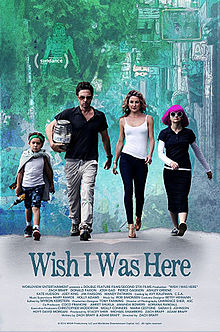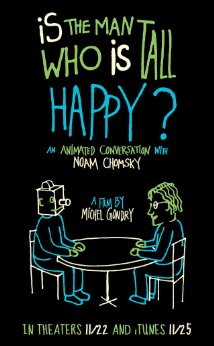(This article about Jewish themes in the 2014 Sydney Film Festival appeared in different version in the Sydney edition of the “Australian Jewish News” on 29 May 2014, under the title “Documentaries with a Jewish focus”.)
There are few better opportunities to take a snapshot of independent international film-making than a large festival such as the Sydney Film Festival. The most likely Jewish audience pleaser this year will be “Wish I Was Here”, written and directed by as well as co-starring American-Jewish actor Zach Braff (“Scrubs”). This mellow and bittersweet comedy-drama has a similar tone to his first feature, the cult favourite “Garden State”, even including similar music. In “Wish I Was Here”, Braff plays a struggling Jewish actor, Mandy Patinkin (“Homeland”) his on-screen father, and Kate Hudson his wife. The film has a notable funding history: Braff obtained more than 46,520 financial backers through the “Kickstarter” crowd-funding website.
As Israeli film and television goes from artistic strength to strength, feature films by Palestinians are slowly but surely making their international mark. Not surprisingly, the primary topic is battling Israel, frequently through acts of terrorism. This year the Festival features “Omar” (in Arabic and Hebrew) by Hany Abu-Assad (“Paradise Now”), and shot in Nablus and Nazareth. This hard-hitting (and for Jews, often hard to watch) thriller was nominated for an Academy Award last year, and tells the story of Palestinian baker Omar who keeps scaling the separation wall to see his girlfriend on the other side. When Omar is captured by Israeli soldiers, tensions are brought to a head. The film’s sympathies are obvious, but the dramatic strength of “Omar” and its all-too-human stories are hard to ignore.
“Omar” has a very tight script, excellent acting and direction: there are some chase scenes through Arab towns that equal the sort of scenes we have seen in the “Bourne” films or Bruce Willis and Tom Cruise vehicles. The strength of “Omar” is that it focuses on the claustrophobic lives of young Arabs caught on the Israeli-Palestine border. Although the perspective is Palestinian, the film – mostly – avoids prominent anti-Israel stereotypes. When three Israeli soldiers humiliate Omar when they stop him on the street (making him stand on a rock), we do not have a hard time imagining that this very event can and does take place. Ultimately, the Israeli-Palestinian conflict provides the background to a strong drama, but this is much less a political film that a study of character and of people caught in forces much larger than they can control.
Film festivals are the natural screening homes of long-form documentaries, and an analysis of the world’s great documentaries and documentary film-makers will surely show that Jews are over-represented in both. This year the Festival features three creative feature-length documentaries on three very different Jewish men: radical academic Noam Chomsky, the late European lawyer and advocate Raphael Lemkin and Hollywood “super-agent” Shep Gordon. Chomsky is well-known for his anti-Zionist views, and in “Is the Man Who is Tall Happy?”, Michel Gondry (“Eternal Sunshine of the Spotless Mind”) presents an original documentary interview with the linguist and commentator, primarily using coloured hand-drawn animation to illustrate the discussion.
In “Watchers of the Sky”, Jewish director Edet Belzberg examines the modern history of genocide. She frames her wide-ranging film through the life of Raphael Lemkin, who was born in 1900 in Belarus, and who invented the term “genocide” in 1944, which he defined as “the destruction of a nation or an ethnic group.” The film’s other hero (if you can call him that) is Benjamin Ferencz, the Hungarian-born Jewish lawyer who became a Chief Prosecutor at the Nuremburg War Crimes trials; at age 94, Ferencz is still active in his global peace work. In covering so many different events (Armenian genocide, Rwanda, Darfur, Yugoslavia), Belzberg risks losing focus: the film reportedly took ten years to make and had a massive 800 hours of footage to edit. “Watchers of the Sky” is undeniably dense and not an easy viewing experience, but a powerful addition to the visual history of genocide and the place of the Holocaust.
By contrast, “Supermensch: The Legend of Shep Gordon”, directed by actor Mike Myers (“Austin Powers”), is a more straightforward and totally upbeat documentary about Hollywood Jewish super-agent Shep Gordon (“The nicest person I’ve ever met”, says Myers). You may have never heard of Gordon, but heart-felt testimonials from Michael Douglas, Sylvester Stallone, Willie Nelson and others may convince you that not everyone in Hollywood is a shark. Celebrities galore and entertaining.
In addition to these films, four other Jewish documentary-makers have important films in the festival. Octogenarian Frederick Wiseman is best-known for his observational ability to capture the “essence” of American institutions such as hospitals, high schools, the army, state government, parks, prisons and department stores. This year, his two most recent films are being screened: “National Gallery” (three hours, fresh from the Cannes Film Festival) about the iconic London gallery, and “At Berkeley” (two parts, each two hours) about the University of California campus.
A more polemic film is “E-Team”, about human rights workers in Syria and Libya, by Oscar-winner Ross Kauffman (who is a Festival guest). Physicist-turned-film-maker Mark Levinson’s “Particle Fever” follows the scientists launching the Large Hadron Collider. And Australia’s own Rod Freedman (“Uncle Chatzkel”) returns with “Once My Mother”, Polish-Australian film-maker Sophia Turkiewicz’s examination of her fraught relationship with her mother, who is slipping into dementia.
To round out the importance of documentaries, the Festival is hosting a panel discussion entitled “Can Docos Change the World?” Speakers include Ross Kauffman and Professor Andrea Durbach, the South African-born Director of the Australian Human Rights Centre at UNSW; the film “A Common Purpose” about Durbach’s work won the Audience Award at the Sydney Film Festival back in 2011, and she is a passionate speaker.
Other Festival films of Jewish note include a gay love story, a New York musical tale, an environmental thriller and a teacher rivalry. In “Love is Strange”, gay Jewish film-maker Ira Sachs’ tells a touching story of two ageing men (played by John Lithgow and Alfred Molina) who are desperate to keep living together but torn apart when one of them loses his job teaching music in a Catholic high school. “Love is Strange” is a small film, set mostly in crowded New York City flats, but it feels so emotionally true that the viewer never strays. Unlike more films and television programs than I can count, this film shows what it is really like to live in New York City: too many people for too little space. The difficulty that the Lithgow and Molina characters have is in finding an affordable place to live together with no income, so each must “board” with friends or relatives, sharing a bedroom (with a nephew) or sleeping on a living room couch surrounded by party people. This is the real New York, not the fake New York of people with large airy apartments all apparently paid for by part-time low-level jobs. Genuinely touching and worth seeing.
In “Begin Again” – described as a “musical valentine to New York City” – Jewish singer-songwriter Adam Levine co-stars as a straying musician boyfriend of the ignored Keira Knightly (Adam, are you serious?). In “Night Moves”, Jesse Eisenberg turns his hand to the thriller genre, starring as an environmental terrorist. “Frank” is a bizarre story about musicians (one of whom always wears a giant fake head), directed by Irish-Jewish film-maker Lenny Abrahamson. In “Words and Pictures”, Clive Owen stars as Jack Marcus, a damaged but inspirational Jewish high school English teacher, whose rivalry with an art teacher (Juliette Binoche) runs a predictable but nevertheless enjoyable course. It’s directed by Australian icon Fred Schepsi, who is also a Festival guest and who will give the Ian McPherson Memorial Lecture.
Fun facts:
Frederick Wiseman’s production company is named “Zipporah Films”. In the Bible, Zipporah was the wife of Moses; it is also Wiseman’s wife’s first name.
Zach Braff’s mother converted to Judaism and Zach is a distant (ninth) cousin to American politician Mitt Romney through her.





 Posted by donperlgut
Posted by donperlgut 
